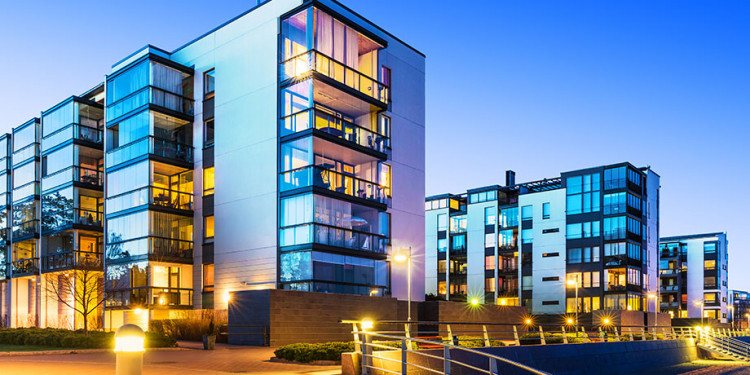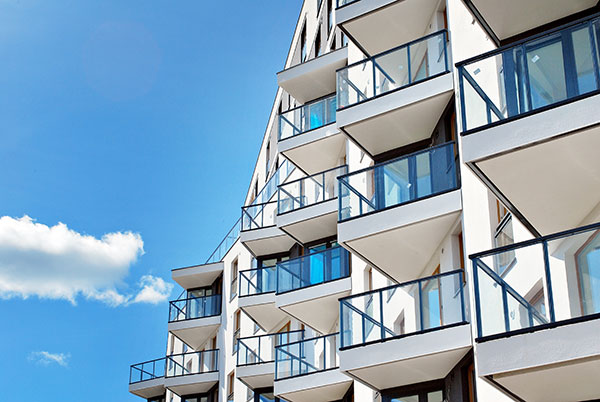
New buildings are popping up all over New Zealand's cities
Buying an apartment or townhouse off the plans, before construction has started, can seem like an attractive opportunity.
Brand-new apartment buildings are popping up all around New Zealand’s cities and a deposit between 5% to 10% is usually the developer’s asking price to seal the deal.
The rest of the balance is due on the completion of construction, which can sometimes be two or three years later, giving buyers enough time to secure the rest of the payment.
But there are both advantages and risks to this type of investment, REDnews explores both the pros and cons of buying off the plans.
The pros of buying off the plans
When buying off the plans, if you get in early you can choose a layout that exactly fits your lifestyle and choose the finishes of building materials.
“If you get in early enough, you could buy at a comparatively lower price, as prices often rise as construction nears completion,” NZ Law Association says.
“If the property market is favourable during the construction of your property, you could potentially make a profit on it between the time of paying your deposit and the final instalment,” NZ Law says.
“Banks routinely demand that developers secure a level of presales before they are prepared to fund the development,” Westpac NZ’s Senior Manager of Credit Strategy and Policy, Heiko Jonkers says.
“Post GFC the level is a level to satisfy 100% of the debt before the bank will fund.
“Developers will often offer attractive terms to secure the presales clients,” Jonkers said.
The deposit for an off-the-plans apartment is usually 5% to 10%
The risks of buying off the plans
The buyer of an off-the-plan property would sign an Agreement for Sale and Purchase (ASP), which typically favours the developer, according to NZ Law.
“Most ASPs contain clauses which mean the developer cannot be held liable for failing to complete your property, and don’t allow you any way out of the agreement.
“Some developers seek to impose cost escalation clauses in their agreements so they can pass on construction cost increases,” NZ Law says.
Depending on whether the housing market rises or falls during the time of construction, you could potentially make a loss if it falls.
“The purchaser should protect themselves from downside risk if something happens to the developer,” Jonkers says.
“Because the units are sold before they are built, the developer must mitigate their risk of construction costs increases over the period of the build.
“This risk increases the longer the presale period is. In most cases, the sales contract allows developers to pass on cost increases to the buyer.
“If the buyer can’t afford the higher price and refuses to settle, they could lose their deposit and the opportunity cost of time spent waiting for the development to complete,” Jonkers says.
“If developers can’t recover cost increases from their presale's clients, they may be forced to compromise on quality to keep the project profitable and minimise losses.
“The client may not get the unit at the spec they anticipated at the time of committing to the project.
“There is also a risk that the developer could liquidate the company if the project goes bad.
“If that happens, the buyer is left as an unsecured creditor to the company and must wait with all the other unsecured for their money. If there are insufficient funds to go around, they will lose their money,” Jonkers said.
Buyers should also look into the ‘sunset clause’ in their contract.
“Simply put, a sunset clause stipulates the date by which the sun sets on the agreement, allowing the property contract to be voided and the deposit be returned to the buyer,” Auckland Property Investors Association states.
The risk here is that you have had your deposit money tied up in an investment which has been later void, therefore losing other opportunities to invest that sum in the meantime.
Buying off the plans can let you in on a new build with luxury design features
Due diligence
“Before buying any property, it’s important to work out exactly what you want and to carry out due diligence,” Media Communications Manager at Real Estate Authority, Amie Paston, says.
“We recommend finding out as much as you can about the property before you make an offer and seeking advice from a lawyer or conveyancer,” she says.
The Real Estate Authority’s website Settled also states that, “You are entirely reliant on the developer and construction firm, so it’s important to do your due diligence.
“What is their reputation? Check their credentials – how long have they been developing properties?
“Take a look at any previous developments they have been involved in.
“Check all the details... what size were the beds in the promotional shots? Ask about soundproofing,” they say.
“Buyers of units off the plan should always seek legal advice before signing the contract,” Jonkers says.
“Ideally, deposit funds should be kept in a solicitor’s trust account to ensure the funds are able to be recovered if the terms of the contract are not met.
“Buyers should fully understand the contract to ensure they don’t face unexpected problems before or during settlement,” he says.

Property, apartments, investment
Inside the purchase of an Auckland apartment
*Michael Rogers paid a 10% deposit for his central Auckland apartment in 2015, which was due for completion in March 2018.
“The settlement and move-in date ended up being June 2018, but it wasn’t a big inconvenience for us as we were living overseas and waiting for it to be completed so we could rent it out until we moved home later in the year,” Rogers says.
“The developers regularly kept us updated on their progress, so tenants knew it was falling slightly behind schedule and could plan for it.
“The price to pay on completion was still the same amount as we originally agreed to and there were only a few teething problems, such as the internet not working, shower fittings breaking, and a leak caused by a plumbing issue.
“But apart from that, we’re really happy with the final build.
“The developers communicated regularly with us and delivered what they’d promised, which is the most important thing,” he said.
Since paying the deposit on the property, the apartment increased in value roughly 20% by the time of completion.
“We were lucky to buy at a moment when the Auckland market was booming.
“We found the experience of buying off-plan stress-free and rewarding.
“The downside is you don’t get to physically experience the apartment before moving in, however the developers provided visuals and detailed sketches, so we knew exactly what we were getting.
“We got our mortgage with Westpac, who were really helpful and explained what we had to do every step of the way,” Rogers says.
But he does recommend doing due diligence and finding out as much as you can about the developer.
“Find out what projects have they recently completed, and did they go to plan?
“Does a Google search turn up any negative news articles about the company or their executives? What sort of reputation do they have within the industry?
“Who are the builders and check what sort of reputation they have,” he said.
*Name changed for privacy
